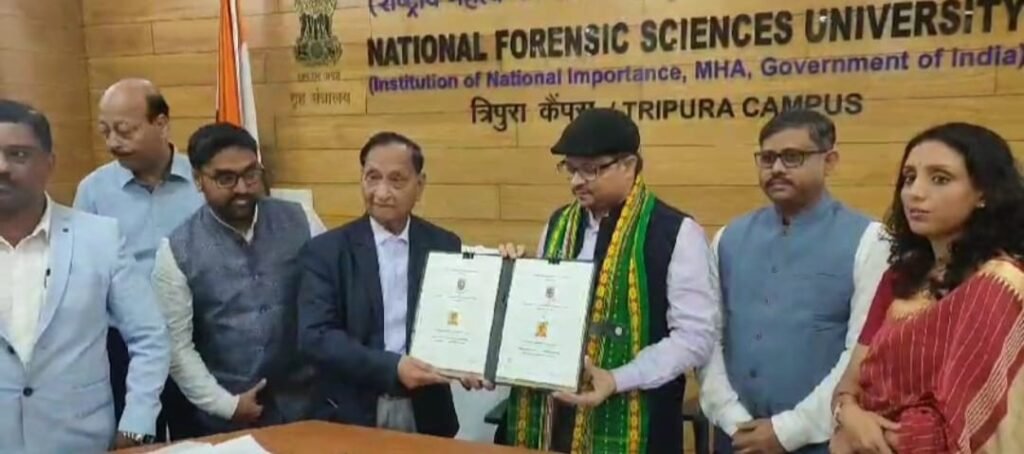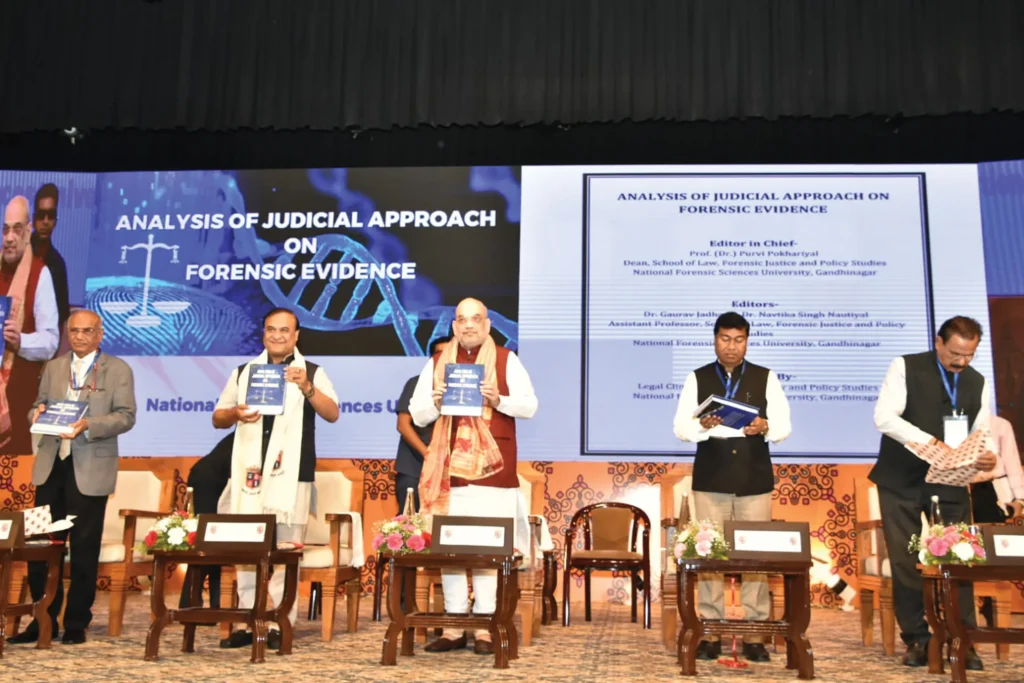
On February 14, 2025, a significant Memorandum of Understanding (MoU) was signed between the National Forensic Sciences University (NFSU) Tripura Campus and the National Law University (NLU) Agartala. This collaboration aims to enhance academic and research cooperation, focusing on joint research projects, faculty and student exchanges, and a holistic approach to criminal justice education. The signing ceremony was described as a historic moment for Tripura, emphasizing the interdependent nature of forensic science and law in maintaining a just society
Specifications of the MoU
Key Areas of Collaboration
Joint Research Initiatives: The MoU emphasizes collaborative research projects that leverage the expertise of both universities. This partnership aims to address contemporary issues in criminal justice, forensic science, and law.
Academic Programs: The agreement facilitates the development of interdisciplinary academic programs that integrate forensic science with legal education. This could include joint degrees or specialized courses that prepare students for careers in criminal justice.
Student Exchange Programs: The MoU encourages student exchange initiatives, allowing students from NFSU and NLUT to gain diverse educational experiences. This exposure will help students understand the practical applications of their studies in different contexts.
Workshops and Seminars: Regular workshops, seminars, and conferences will be organized to foster dialogue between students and faculty from both institutions. These events will focus on current trends and challenges in forensic science and law.
Capacity Building: The collaboration aims to enhance the capabilities of faculty through joint training programs and knowledge-sharing initiatives, ensuring that educators are well-equipped to teach interdisciplinary courses.
Significance of the MoU
Strengthening Forensic Education: This partnership is particularly significant in light of India’s growing emphasis on forensic science within the criminal justice system. By combining resources and expertise, both universities can enhance the quality of forensic education.
Addressing Legal Challenges: As new criminal laws are implemented, there is a pressing need for professionals who understand both legal frameworks and forensic methodologies. This MoU aims to produce graduates who are well-versed in both areas.
Regional Development: The collaboration is expected to contribute to the development of forensic science practices within Tripura and surrounding regions, improving local law enforcement’s effectiveness and fostering a culture of evidence-based justice.
Interdisciplinary Approach: By integrating forensic science with legal studies, the MoU promotes an interdisciplinary approach to education, which is essential for addressing complex issues in modern society.
Enhancing Research Output: Collaborative research efforts will likely lead to innovative solutions and advancements in both fields, benefiting not only students but also practitioners in the field of law enforcement and legal practice.
Conclusion
The MoU signed between NFSU and NLUT represents a strategic alliance aimed at enhancing educational offerings, research capabilities, and professional development in forensic sciences and law. By fostering collaboration between these two institutions, the partnership seeks to address contemporary challenges within the criminal justice system while preparing students for successful careers in an increasingly complex legal landscape.
FAQS
- What is the purpose of the MoU between NFSU and NLUT?
The MoU aims to enhance academic and research collaboration between NFSU and NLUT, focusing on integrating forensic science with legal education, promoting joint research initiatives, and facilitating student exchange programs.
- When was the MoU signed?
The MoU was signed on February 14, 2025.
- What specific programs will benefit from this collaboration?
The collaboration will benefit various programs, including joint degrees in forensic law, cyber forensics, and interdisciplinary courses that combine forensic science with legal studies.
- How will students benefit from this MoU?
Students will have access to joint academic programs, research opportunities, and student exchange initiatives that provide diverse educational experiences and enhance their employability in fields related to law and forensics.
- Will there be any workshops or seminars as part of this collaboration?
Yes, the MoU includes provisions for organizing regular workshops, seminars, and conferences focused on current trends and challenges in forensic science and law.
- How will faculty be involved in this collaboration?
Faculty from both institutions will engage in joint training programs, collaborative research projects, and knowledge-sharing initiatives to enhance their teaching capabilities in interdisciplinary courses.
- What is the significance of this MoU for the region?
This collaboration is expected to strengthen forensic science practices within Tripura, improve local law enforcement effectiveness, and foster a culture of evidence-based justice in the region.
- Are there any plans for future collaborations beyond this MoU?
While specific future collaborations have not been detailed, the MoU lays a foundation for ongoing partnerships that may evolve into more extensive academic and research initiatives over time.
- How can prospective students learn more about the programs offered through this collaboration?
Prospective students can visit the official websites of NFSU and NLUT or contact their admissions offices for detailed information about the programs available under this collaboration.
- Where can I find official announcements or updates regarding this MoU?
Official announcements and updates can typically be found on the websites of NFSU and NLUT, as well as through press releases and credible news sources covering higher education developments.

